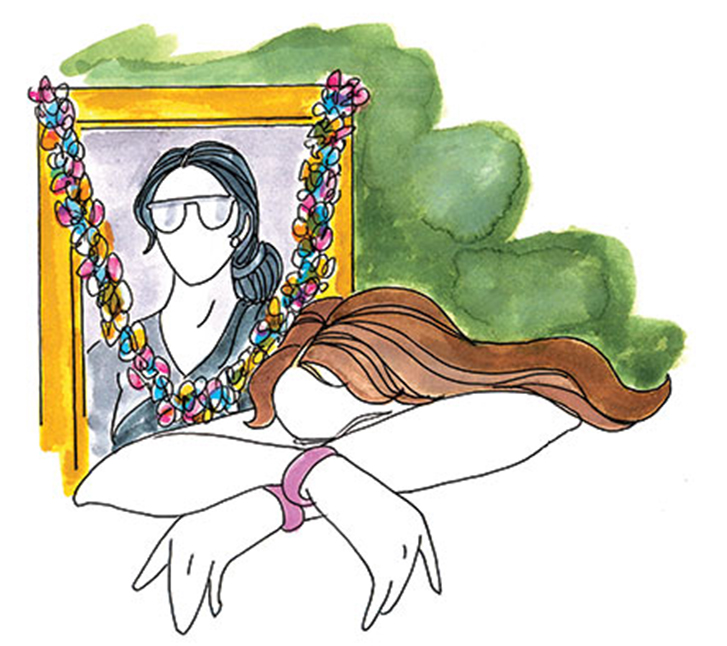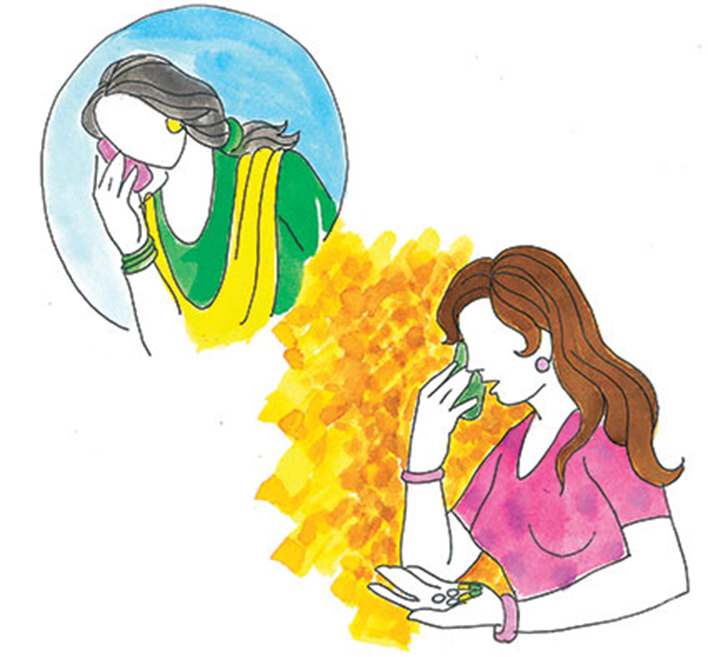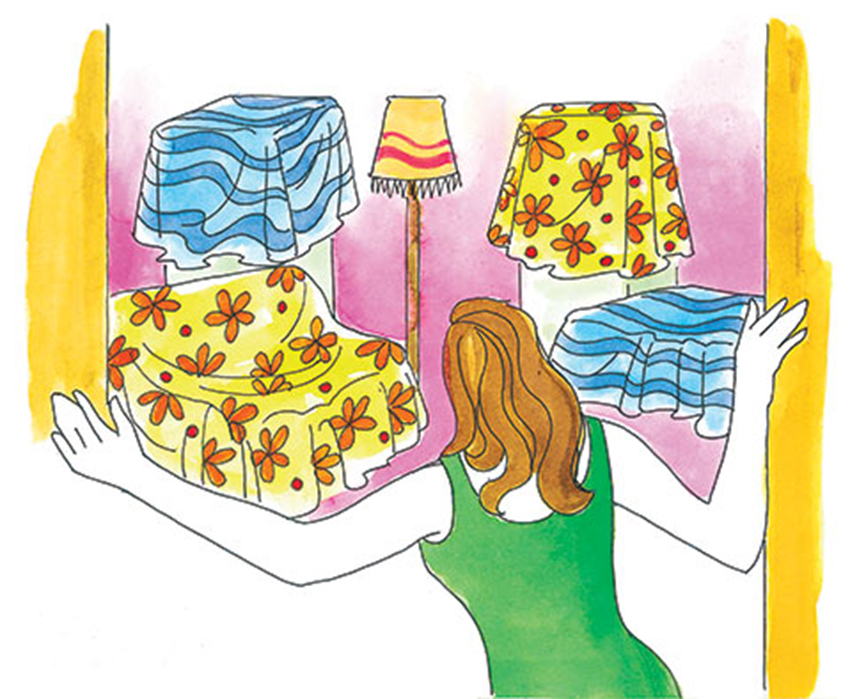The door still creaked when she opened it. The familiarity of that single sound made her lips curve up; just a little thing, but more than anything she had been able to drum up in the past few weeks. That little creak reassured her that when her crumbling life was making sounds that she couldn’t begin to decipher, there was still something she could safely predict.
She had become maudlin, she realized, as she stood on the threshold of her old home. It was the damned pills. It was always the pills. They made her weak and nauseous when she took them. They made her desperate and hollow when she didn’t.
It was a choice between dependence and debilitation. And to her, there wasn’t a pin to choose between them.
She shook herself and walked inside the little flat. It was like a set from a badly produced horror movie. Everything was covered in dust sheets. A decidedly cheerful horror movie, she realized, as she saw the flowery, bright patterns on the sheets. She could recognize nothing in the flat. Everything was meticulously covered—awkward lumps laid out in perfect order. It was neat enough to set her teeth on edge. Uma Maaushi* had done a thorough job.
The neatness was so unlike her haphazard aunt, she forgot about herself for a while as she moved from room to room to inspect Maaushi’s handiwork. Aai’s* death had reduced her to a mass of nothingness. But, apparently, it had turned Uma Maaushi into a neatness freak. She imagined her mother nodding in grim satisfaction at the orderliness of the house. Death is no excuse to be sloppy, her mother would have said. ‘No Aai’ she thought, as she stood in the middle of the little house. But sometimes, it is a reason for much worse things than sloppiness. Her hands clutched around the purse at her shoulder.
It was past time to deal with things she had shelved—mental illness or no mental illness. The practical things couldn’t wait, she realized, as she forced herself to walk into her mother’s room. It was dark, shielded from the bright afternoon sun with the drapes pulled tightly shut. She dumped her purse near Aai’s wardrobe and stood back to inspect the room.
Her mother had been dead for six months. If she had completed her transit to heaven by now (and knowing how efficient she was, she had probably planned the whole trip five days in advance, with a checklist), she would have ‘tsked’ over her daughter’s procrastination, from above. She might have ‘tsked’ over a lot of other things too. Her daughter’s mental health, for one. Or lack thereof. Her mother would have judged her. She would have probably cloaked her embarrassment, considering how adept she had been at hiding emotions. Even clams had nothing on her mother in that department. But the bottom-line was that her mother would have been ashamed of her.
She sat down and sank into her mother’s bed, trying to ignore her shaking hands. There it was. Among all the things that pushed her into the dark, this one swept across her so viciously, it made her teeth ache. Her mother had been a force of nature. Aai never brooded, she Got Things Done. She never sat ruing about what wasn’t; she salvaged what could be. And her daughter was sitting on her bed, branded potentially suicidal, completely battered. There was irony for you.
The shame of it licked at her mind. She had always been the strongest among her friends. How stupid of her to assume that such things couldn’t happen to her, she thought for the hundredth time, gripping the mattress till her fists ached. She shut her eyes. She needed to stop thinking. She remembered to take deep breaths.
Her family needed her. Maaushi and Kaka*, Chachu and Aatya, all of them needed her to be strong, as usual. They depended on her to be stable. That’s why she couldn’t tell them about this, she rationalized. It had nothing to do with shame. She wasn’t ashamed; she was just being cautious. Her friends were all wrong, she thought. Sure, they had done the right things when they had thought she had gone round the bend. They had dragged her to the psychologist. They ensured she took her pills. They set up a phone chain so she could alert them when she was… feeling particularly blue. That was all correct. But she couldn’t tell her family. Especially Maaushi. That was wrong. They were wrong about this.
Her therapist’s words came back to her. “Telling the family doesn’t work for everyone,” he had said. “But I think it might work for you. Consider it.”
She refused to consider it. Maaushi wouldn’t understand. She would judge. She didn’t need to know. She swayed backwards and forwards, and she repeated this to herself, her hands wrapped around her, elbows cupped in her palms. She was not going to allow herself to sink into that darkness again. When the motion relaxed her, she got off the mattress and walked to the sink on auto-pilot. She washed her face. Wiped it clean.
There, she thought. It’s passed.
It’s gone.

And it was time to do what she came here for. She dreaded the tedious process of going through her mother’s things. Maaushi had handled everything after Aai’s death. This was just the one thing Uma Maaushi had asked her niece if she could do. Clean up the wardrobe, get the furniture packed and get the hell out. And then contact brokers. Putting this little flat up for sale was not going to be hard at all. She just needed to finish it before she choked on her memories. And with her, the danger was literal.
Five hours later, she was sitting cross-legged on the floor with Aai’s clothes around her, staring at the dust motes dancing in the light of the late afternoon sun as she took
a little break. The clothes all smelled of her mother—of talc and lemons. She had equated that smell with efficiency. And surprisingly, with each shelf that she cleaned out and each item of clothing that she bagged away, she felt steadier. As if all that efficiency was seeping into the air and becoming a part of her. If she could only be around the clothes, a reminder of her mother’s matter-of-factness, she thought, as she bagged away the oldest clothes that sat in the deepest recesses of mum’s closet, she would get her old self back.
That was when she saw them.
And, her world came crashing down on her again.
Tucked away among the old socks and soft dupattas, there were strips of Zoloft. Her hands were utterly cold… numb when she picked them up. She knew what they were. But she didn’t understand. What would Aai need anti-depressants for? They must be someone else’s, she reassured herself, as she picked them out. She had almost convinced herself when she saw the prescription peeking out from under older clothes. There, it seemed to sneer at her, explain this now. She picked up the paper and read her mother’s name on it.
But this was Aai’s closet. It was not supposed to have things like these pills. It was supposed to have old silk saris and silver, loose kurtas and extra handkerchiefs. Her fingers were numb as she set the pills away with absolute precision. She got off the floor on shaky legs, her mind struggling to understand what she saw. She pressed her fingers to her temples, as her mind raced and raced and got nowhere.
She needed to get away from that room, she thought abruptly. She walked out in a panic, miraculously still thoughtful enough to grab her keys, before she jabbed her feet into the first available pair of slippers and rushed out of the house. Walking would help. She would just walk this panic off so she could just think.
Nothing was right anymore. Nothing was going the way it should. Mothers were dying, and hiding pills in their closets while pretending to be strong. The thought sparked such anger in her that she sputtered.
How dare she? How dare Aai let her think that she was invincible and then stash pills away? A woman whom she had thought to be a paragon of strength was a liar. Like mother, like daughter, she realized. Both of them were frauds, after all.
She stopped.
And that’s when it hit her that she had walked down the little lanes of Versova and reached the beach—it was reflexive.

It was the place where she came to with Aai when she needed her advice. Her mother would always talk softly, seriously. Sometimes it would be judgemental, sometimes dripping with empathy; but always luscious with Aai’s brand of firm love. Aai’s voice seemed to drift over the soft ocean breeze, as she walked towards the foaming surf. Countless bits of Aai’s wisdom—some helpful, some utterly useless—hung heavily in the humid air.
“Why, Aai?” she whispered.
“Why would you hide such a thing from me?”
She shut her eyes against the pain and felt the pinkish glow of the sun underneath her eyelids. In the soft racket of sounds playing in her head, she heard one of the most cliché phrases Aai trumpeted: “Falling apart is coming together.”
And small details ebbed and flowed in her mind, swamping her in waves. The lines around her mother’s mouth when she thought no one was looking, how Aai’s hankies would be slightly damp always, clumps of hair in the drain after Aai had washed her hair, the dark circles around Aai’s eyes. And yet, the firmness of Aai’s grip, the confidence of her voice, the sweetness of her lullaby.
Through the mess of emotions she was struggling to unwind—sympathy and rage, hurt and disbelief, anger and love—she knew this one thing with absolute clarity. Her mother had been strong. How did a box of pills change the fact that her mother had been a singularly remarkable woman? Not even a little, she realized.
Her cheeks were not wet anymore. There was wind her in hair. She ran her hands through it, shaking
it back.
Her mother was the strongest person she had known. But Aai had needed pills. All her strength had not equipped her to deal with her depression. Not in a real way. Not enough to talk about it to the daughter she loved. She almost smiled at that thought. Her mother had taught her to be judgmental as well, it seemed.
Perhaps she could learn something by herself now. And be stronger than her mother.
Or just a different kind of strong.
She looked on and on. The sharpness of the diamonds that the sun had lit on the surface of the sea faded to a pearly incandescence in the glow of the moon. She sat there hearing, smelling and watching the water. And got up when she finally realized what to do.
The flat was dark when she let herself in. She switched on a little lamp in the living room. And made the call. Uma Maaushi answered on the first ring. She didn’t give her aunt a chance to speak, but barrelled on.
“Hello, Maaushi. Listen, just listen, okay? I have to tell you something. I might cry, but I need to get this out. I haven’t told anyone in the family this since Aai died, but….”
On the other side of the phone, Uma sat down on her sofa and smiled. It was about time, she thought, that the girl let her Aunt help her.
Meera had found her mother’s pills in the wardrobe. Uma would know. She had put them there, after all.
And now, hopefully, Meera was going to find herself again, too.
She would finally climb out of the dark.
-Damini Kulkarni


